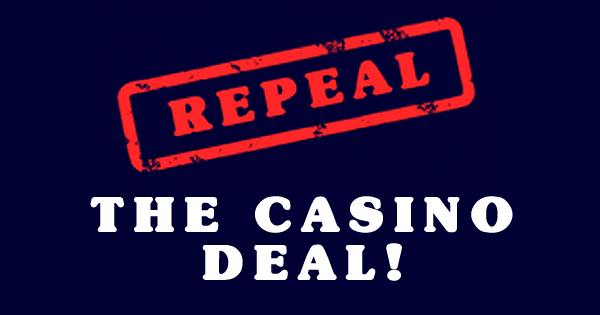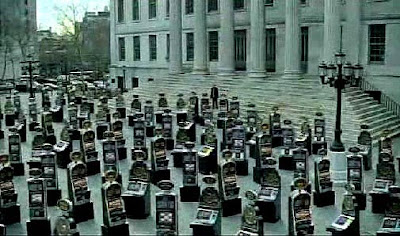
While delaying a vote would give gaming opponents more time "to gain steam," Barrow said he does not expect that to shape the debate."Everybody's polling shows the opposition is down to bedrock and, if anything, support is growing."
-- Casino Drive Stalls, SouthCoastToday.com
There he goes again. Prof. Clyde Barrows, gambling industry shill in policy analyst drag, pulling yet another inane quote out of his backside in an on-going effort to spread inevitability and misinformation via the media.
First of all, Clyde, we're not 'gaming' opponents. I know that I, for one, do enjoy the occasional game of baseball or badminton or monopoly. What we do oppose are slots, a predatory form of gambling, disguised as a mostly harmless pastime, that just happens to generate crime, addiction and misery everywhere it goes.
So, Clyde, exactly what polling is it that leads you to believe the gambling 'opposition is down to bedrock'?
And would that be the same polling that relies on the fact that the majority of the public doesn't fully understand the issue?
And how about the poll that indicated that most people would rather live near a nuclear power plant than a casino?
Hey - here's a poll for you - it was taken at the Massachusetts Democratic Convention this summer and ended in that party's resolution to oppose predatory slot machines.
Because Clyde, the more people understand about this issue - like how slot machines work, or should I say, swindle - the more they tend to oppose it.
You know, I'll never forget the first time I witnessed Clyde in action. He prefaced his talk that evening by insisting that while the debate over gambling is passionate, he would not be focusing on anything but THE MONEY.
And that, folks, is the problem. Researchers and blowhards alike count the money coming in, but forget about the costs - mostly because coming up with ways to measure things like the after-effects of crime and addiction and ruined lives proves tricky for a mediocre (or just plain lazy) researcher.
Because there's no button on a calculator to push for a child who doesn't eat dinner when the grocery money goes down the gullet of a slot machine, or for the elderly man who lost the savings he built up over a lifetime after taking some free bus trips to Foxwoods, or for the young woman robbed at gun point, or for the spouse with the black eye and the broken arm.
So, it's easier to just leave that stuff off the balance sheet while pronouncing to the media or a Statehouse subcommittee that it's all good.
Time after time after time, I've read a report that outlines all the benefits of expanded gambling - only to notice that the messy stuff like crime and addiction - the stuff they like to call 'social ills' - hasn't even been factored into to the equation. Or that this is 'beyond the scope' of the report.
And this makes a lot of politicians assume they can just throw a figure out there for regulation and addiction treatment and all will be right with the world. But they can't. Those little ruined lives, those tiny tragedies, they start adding up while the small financial gains from gambling revenue are quickly spent.
And of course, once you let the gambling vampire in the door, he just can't get enough blood. Once the State relies on gambling income, the industry will call the shots. Not you, not me, not anyone who doesn't toe the party line. And that, in this great State, founded on freedom, would be yet another tragedy.
As far as the opposition being down to bedrock, well, you know what bedrock is don't you? It's a rock solid, steadfast foundation. What it's not is a paper sailboat drifting across a muddy puddle of promises and pipe dreams. And it's not a half-assed research report or a misleading quote.
And so Clyde, as one proud denizen of the town of Bedrock, I'll leave you with the immortal words of Pebbles Flintstone - because I think she might have been singing this one just for you:
Mommy told me something
A little kid should know
It's all about the devil
And I've learned to hate him so
She said he causes trouble
When you let him in the room,
He will never ever leave you
If your heart is filled with gloom
Face it with a grin
Smilers never lose
And frowners never win
So let the sun shine in
Face it with a grin
Open up your heart and let the sun shine in






























